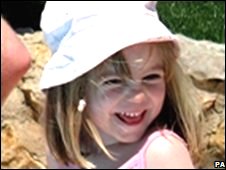|
Gerry McCann:
'Coverage could have destroyed our family |
Madeleine
McCann was treated as a "commodity" by the UK press, her father
Gerry has told MPs.
Some reports about the missing
girl had been "embellished" or even made up, the culture, media
and sport select committee was told.
Papers had, without evidence,
published stories suggesting Madeleine was dead, which could
have stopped people looking for her, Mr McCann said.
Madeleine, of Rothley,
Leicestershire, vanished in Portugal in May 2007.
This happened shortly before
her fourth birthday.
Prosecutors initially placed
"arguido" - or formal suspect - status on Mr McCann and his wife
Kate but this was lifted in July last year when the case was
shelved as detectives stopped actively searching for the
youngster.
'Incredibly upsetting'
Mr McCann told the MPs:
"Although elements of the media coverage have undoubtedly been
helpful in the ongoing search for Madeleine, our family have
been the focus of some of the most sensationalist, untruthful,
irresponsible and damaging reporting in the history of the
press.
"If it were not for the love
and tremendous support of our family, friends and the general
public, this disgraceful conduct - particularly in the tragic
circumstances in which we find ourselves - may have resulted in
the complete destruction of our family."
He said: "To be thrust from
being on holiday one minute into the middle of an international
media storm, and how to cope with that, was very, very
difficult."
He said the media were much
more interested in writing about him and his wife - what he
called the "Kate and Gerry show" - than about the search for
Madeleine.
Mr McCann also said: "To see a
front-page headline insinuating that you were involved in your
own daughter's disappearance, it was incredibly, unbelievably
upsetting."
| |
THE
INQUIRY |
 |
Gerry McCann is the latest witness to appear
before the House of Commons Culture, Media and
Sport Select Committee during their
investigation into "press standards, privacy and
libel".
|
Asked about the coverage of
his daughter's disappearance, Mr McCann said: "We saw pressure
particularly on journalists to produce stories when really there
was nothing much to report."
He added: "Madeleine was made
a commodity and profits were to be made."
Mr McCann said there had to be
"some degree of control" over reporting, because newspapers had
"the potential to ruin people's lives".
Didn't watch broadcasts
He told the MPs that
immediately after the disappearance the media had shown a
"desire to try to help get facts that would lead to Madeleine's
whereabouts".
But he added: "Much of the
content in the first few days was highly speculative. It was not
at all helpful to us.
"We fairly quickly decided for
our own benefit not to watch the broadcasts or, indeed, to read
the newspapers."
 |
Madeleine McCann went missing in May 2007 in
Portugal
|
Coverage had become more
"damaging" after the couple were named "arguidos", he added.
Mr McCann was also critical of
many of the contributors to newspaper - and other website -
chatrooms.
He said many had "too much
time on their hands", adding: "I feel very sorry for those
people who a need to do that [write abusive and unsubstantiated
comments] and there's something clearly missing in those lives."
The McCanns' spokesman,
Clarence Mitchell, told the committee there had been a "churning
upon churning of inaccuracy" by the media.
The police in Portugal made
less use of public appeals to gain evidence than those in the
UK, Mr McCann said, which had created a "difficult situation"
for the family.
Madeleine's parents, the
friends who were with them on the holiday and one-time suspect
Robert Murat have all won apologies and pay-outs from
newspapers.
But Mr McCann said: "I can't
say that the damage that's been done has been reversed."
He told the committee his
lawyers had advised him and his wife against going through the
Press Complaints Commission with their concerns - they took
legal action instead.
Madeleine was almost four
years old when she disappeared from a holiday flat in Praia da
Luz, in the Algarve, on 3 May 2007.
The committee is holding an
inquiry into press standards, privacy and libel. Earlier on
Tuesday it heard from international motor racing boss Max Mosley |


